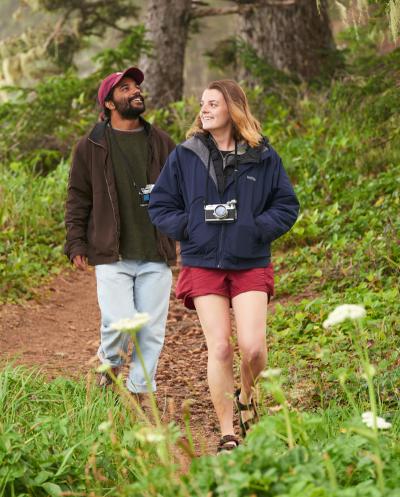1-30-19
By Tiffany Woods
CORVALLIS, Ore. – Miles Phillips’ job is to help coastal tourism businesses be successful, particularly those involved with outdoor recreation.
Hired in 2016, the tourism specialist with Oregon Sea Grant and the Oregon State University Extension Service has been busy letting them know he’s here.
“One of the biggest things I’ve been doing,” he said, “is creating awareness in the tourism industry about Oregon Sea Grant and Extension and saying, ‘There’s new help available.’”
![]() That new help includes training. Phillips helped create the curriculum for a course that helps guides enhance customers’ experiences. Called the Guide and Outfitter Recognized Professional program, or GORP, it consists of in-person workshops and four self-paced, online lessons.
That new help includes training. Phillips helped create the curriculum for a course that helps guides enhance customers’ experiences. Called the Guide and Outfitter Recognized Professional program, or GORP, it consists of in-person workshops and four self-paced, online lessons.
Participants come away with knowledge about Oregon’s coastal towns, rivers and mountains and its timber, dairy and fishing industries. They also learn to identify 101 plants and animals. Other topics include customer service, group management and best practices for being safe during outdoor adventures. The instruction is based off voluntary guidelines set by the Adventure Travel Trade Association. Thirteen guides completed the full GORP online program during the first offering in 2018. A second cohort started in January 2019.
According to a report by Phillips, as of July 2017 more than 1,300 people were registered as outdoor recreation guides through the Oregon State Marine Board, the entity that allows people to work as paid guides in the state. The Oregon coast is home to about 130 of them, he said.
With an eye toward grooming the next generation of guides, he also helped create the curriculum for a new 4-H club in North Bend to teach high school students about entrepreneurship in the context of being an outdoor guide. They develop a short business plan, meet guides, and go on outings.
At the request of the Bay Area Chamber of Commerce, Phillips helped develop the curriculum for a one-hour, online training for employees and volunteers who interact with tourists in Coos Bay, Charleston and North Bend. These “community ambassadors” learn to share information about local tours, cultural activities, wildlife, food and lodging. More than 100 people have enrolled, he said.
 Wanting to give tour operators a better understanding of how visible their websites are, he enlisted the help of two interns – through Oregon Sea Grant’s Summer Scholars program – who analyzed Google search rankings for coastal companies that offer whale-watching, salmon-fishing and kayaking tours. “We found that many guides are not effectively marketing themselves online,” he said.
Wanting to give tour operators a better understanding of how visible their websites are, he enlisted the help of two interns – through Oregon Sea Grant’s Summer Scholars program – who analyzed Google search rankings for coastal companies that offer whale-watching, salmon-fishing and kayaking tours. “We found that many guides are not effectively marketing themselves online,” he said.
The interns also compared the companies’ prices. Of the 35 salmon-fishing companies that appeared in their searches, they found that 10 made the mistake of not including information on pricing. “If potential customers are searching online and don’t see a price, they’re not likely to call,” Phillips said.
He also produced a report about the workforce training needs of coastal businesses and organizations with an interest in tourism. It was based off findings from the Oregon Coast Visitors Association’s survey of representatives of hotels, restaurants, retail stores, guide companies and various organizations. About a third said it was “extremely difficult” to find good employees. The most desired trainings were in customer service, housekeeping, human resource issues and marketing. Some also expressed a need for training in social media. As a result, Phillips helped organize a free workshop in Coos Bay in January to teach businesses how to enhance their use of social media.
Phillips is now busy planning a national conference on sustainable tourism and outdoor recreation set to take place in Astoria this Oct. 8–11.
As Phillips looked back at his accomplishments, he said, “We’re really carving out a significant role in the business and workforce training element. We’ve done a lot, but there’s a lot more to do.”